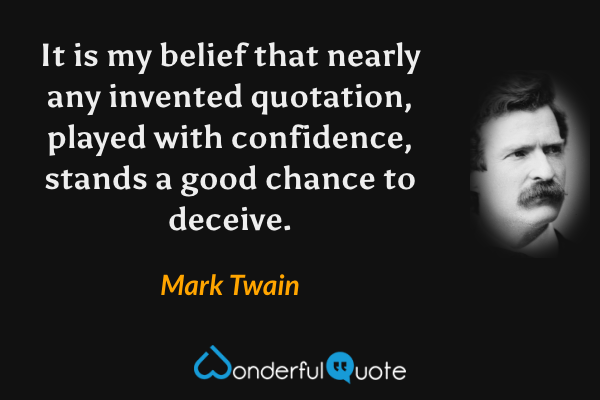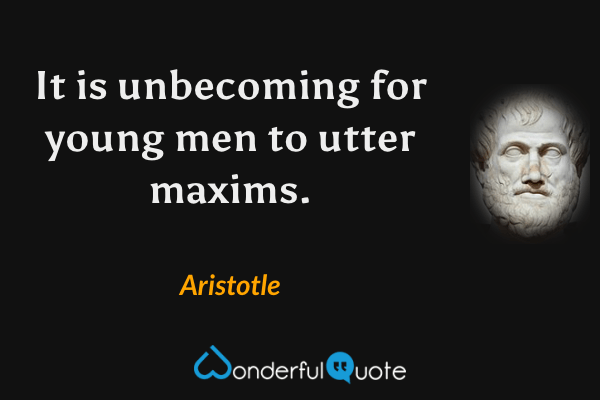Quotations Quotes
Most popular quotations quotes

I quote others only to better express myself.

A witty saying proves nothing.

The next best thing to being clever is being able to quote some one who is.
An anthology of quotations is a museum of utterances. It collects and displays masterpieces of phrase and thought in a small space.
Reframing an extract as a quotation constitutes a kind of coauthorship. With no change in wording, the cited passage becomes different. I imagine that the thrill of making an anthology includes the opportunity to become such a coauthor.

Most public speakers talk so badly that a sudden quotation from a poet appears in their babble like a lady in a slum.

One must be a wise reader to quote wisely and well.

Quotations in my work are like wayside robbers who leap out, armed, and relieve the idle stroller of his convictions.
Even small quotations can be valuable, like raisins in the rice pudding, for adding iron as well as eye appeal.

I pick up favorite quotations, and store them in my mind as ready armor, offensive or defensive, amid the struggle of this turbulent existence.

Collecting quotations is an insidious, even embarrassing habit, like ragpicking or hoarding rocks or trying on other people's laundry.

You evidently do not suffer from "quotation-hunger" as I do! I get all the dictionaries of quotations I can meet with, as I always want to know where a quotation comes from.
A quotation, like a pun, should come unsought and then be welcomed only for some propriety or felicity justifying the intrusion.
Collecting quotations seems a similar occupation to the one practiced by those birds and animals who pick up shiny pebbles, pieces of glass and paper to line their nests and burrows.

Beware of thinkers whose minds function only when they are fueled by a quotation.

That's the point of quotations, you know: one can use another's words to be insulting.

Quoting, like smoking...is a dirty habit to which I am devoted. But then...I am a professor of English literature; it is an occupational hazard.

To be apt in quotation is a splendid and dangerous gift. Splendid, because it ornaments a man's speech with other men's jewels; dangerous, for the same reason.

I love them because it is a joy to find thoughts one might have, beautifully expressed with much authority by someone recognizedly wiser than oneself.

The wisdom of the wise, and the experience of ages, may be preserved by quotation.

Whenever we would prepare the mind by a forcible appeal, an opening quotation is a symphony preluding on the chords whose tones we are about to harmonize.
I am not merely a habitual quoter but an incorrigible one. I am, I may as well face it, more quotatious than an old stock-market ticker-tape machine, except that you can't unplug me.
I believe it was Gayelord Hauser, the nutritionist, who said that "You are what you eat," but if you happen to be an intellectual, you are what you quote.
We who are quotatious are never truly alone, but always hear the cheerful flow of remarks made by dead writers so much more intelligent than we.
I enjoy collecting quotations. When I find a choice one I pounce on it like a lepidopterist. My day is made. When I lose one because I did not copy it out at once I feel bereft.

A quotation in a speech, article, or book is like a rifle in the hands of an infantryman. It speaks with authority.
If people now read fewer and fewer of the same books, listen to the same authorities or even watch the same television shows, we nevertheless find that we can hardly communicate without falling back on bits of quotation, steppingstones in the muck of daily discourse.
The quotation-business is booming. No subdivision of the culture seems too narrow to have a quotation book of its own.
We speak a language that draws on quotations. They are telegraphic, a form of shorthand. We use them to lend point and luster to what we say.
We use quotations, like the Biblical Shibboleth, as passwords and secret handshakes, socially strategic signals that say, "I understand you. We speak the same language."
As a general rule, Misquotations drive out real quotes. This is The Immutable Law of Misquotation.

The Achilles heel of quotation collections: An initial error in one will be repeated so often by others that over time it gains authority through repetition alone.

When it comes to quotations, memory is too much the servant of aspirations, not enough an apostle of accuracy.
In literary composition a well-chosen quotation lights up the page like a fine engraving.

He wrapped himself in quotations—as a beggar would enfold himself in the purple of Emperors.

An apt quotation is like a lamp which flings its light over the whole sentence.
A good quotation is a keyhole view of a boundless universe, like one of those windows called "squints" in medieval cathedrals through which only the altar is visible.
There are people who exist only on the pages of quotation books, whose life and work has evaporated completely, leaving behind just one or two puddles of wisdom.
Banter is not a solitary activity. And quotations are the hard currency of banter.
A quotation is a polished prefabricated unit of thought or discourse which has many connotations and associations built into it.

She had a pretty gift for quotation, which is a serviceable substitute for wit.
A collector of quotations inevitably has some of the qualities of a parasite, feeding off the labors of others.
Quotable quotes are coins rubbed smooth by circulation.
Quotations are in a perpetual struggle for survival. They want people to keep saying them. They don't want to die any more than the rest of us do. And so, whenever they can, they attach themselves to colorful or famous people.
There is a subset of quotations that are personal. We pick them up off the public street, but we put them to private uses.

When a thing has been said so well that it could not be said better, why paraphrase it? Hence my writing is, if not a cabinet of fossils, a kind of collection of flies in amber.
Unless created as freestanding works, quotations resemble "found" art. They are analogous, say, to a piece of driftwood identified as formally interesting enough to be displayed in an art museum or to a weapon moved from an anthropological to an artistic display.
Quotes are the mental furniture of my life. From certain angles my inner landscape resembles a gallery hung with half-recalled citations, the rags and tag-ends of a lifetime of reading and listening.
Quotations, the karaoke of ideas.

A good quotation must be a complete entity. It must be like a headline—sharp, clear, whole.
A quotation should say something in a particular way—perhaps wittily, pithily, vividly—but in such a way that it demands to be repeated by others.
Long ago, I coined the term "Churchillian Drift" to describe the process whereby the actual originator of a quotation is often elbowed to one side and replaced by someone more famous.
A fine quotation is a diamond on the finger of a man of wit, and a pebble in the hand of a fool.
Like a banister after years of handling, quotes get polished with use.

I think of quotes as mini-instruction manuals for the soul.
As windows admit light to a house, quotations and illustrations shed clarity to a lesson, sermon, or speech.

It is my belief that nearly any invented quotation, played with confidence, stands a good chance to deceive.

In the dying world I come from a quotation is a national vice. No one would think of making an after-dinner speech without the help of poetry. It used to be the classics, now it's lyric verse.

One has to secrete a jelly in which to slip quotations down people's throats—and one always secretes too much jelly.
Wise men make proverbs, but fools repeat them.

It is unbecoming for young men to utter maxims.

Quotation is a serviceable substitute for wit.


